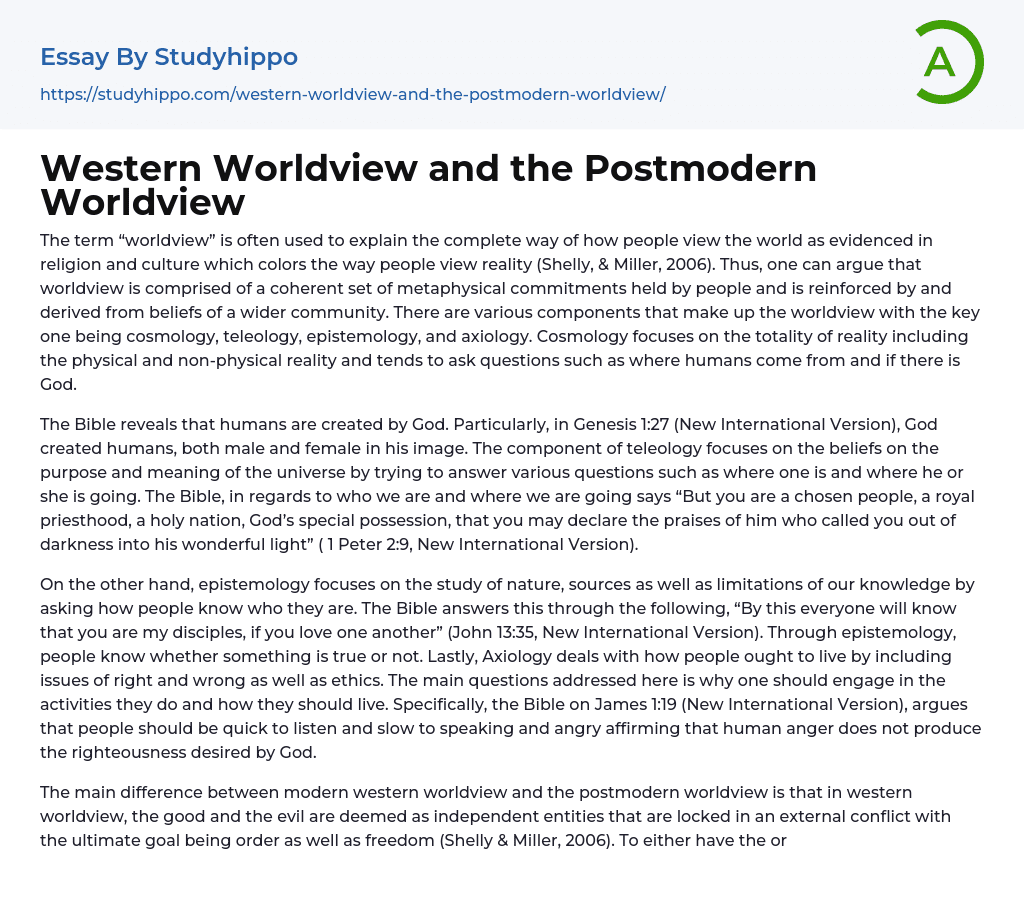

Western Worldview and the Postmodern Worldview Essay Example
The term “worldview” is often used to explain the complete way of how people view the world as evidenced in religion and culture which colors the way people view reality (Shelly, & Miller, 2006). Thus, one can argue that worldview is comprised of a coherent set of metaphysical commitments held by people and is reinforced by and derived from beliefs of a wider community. There are various components that make up the worldview with the key one being cosmology, teleology, epistemology, and axiology. Cosmology focuses on the totality of reality including the physical and non-physical reality and tends to ask questions such as where humans come from and if there is God.
The Bible reveals that humans are created by God. Particularly, in Genesis 1:27 (New International Version), God created humans,
...both male and female in his image. The component of teleology focuses on the beliefs on the purpose and meaning of the universe by trying to answer various questions such as where one is and where he or she is going. The Bible, in regards to who we are and where we are going says “But you are a chosen people, a royal priesthood, a holy nation, God’s special possession, that you may declare the praises of him who called you out of darkness into his wonderful light” ( 1 Peter 2:9, New International Version).
On the other hand, epistemology focuses on the study of nature, sources as well as limitations of our knowledge by asking how people know who they are. The Bible answers this through the following, “By this everyone will know that you are my disciples, if you love one another” (John 13:35
New International Version). Through epistemology, people know whether something is true or not. Lastly, Axiology deals with how people ought to live by including issues of right and wrong as well as ethics. The main questions addressed here is why one should engage in the activities they do and how they should live. Specifically, the Bible on James 1:19 (New International Version), argues that people should be quick to listen and slow to speaking and angry affirming that human anger does not produce the righteousness desired by God.
The main difference between modern western worldview and the postmodern worldview is that in western worldview, the good and the evil are deemed as independent entities that are locked in an external conflict with the ultimate goal being order as well as freedom (Shelly & Miller, 2006). To either have the order or freedom, one side ought to gain control over the other such that the reality is proportionally divided into two camps as evidenced in the American trends of categorizing things in opposite for instance sweet and sour, truth and false and good and bad.
On the other hand, in a postmodern worldview, nothing is fixed as everything is contingent. This worldview argues that reality beyond human understanding and the situation humans are often in prevents them from having facts about the world (Harrison, 2010). While this does not imply that there is no real world, it directly implies that humans have no capability of shedding their perception to access it. Thus, the main difference lies in that fact that while western worldview is concerned with the reality of the world, the concern of postmodern worldview is the
manner in which humans perceive and explain the world.
I believe that I identify with all the parts. In respect to western worldview, my spiritual setting implies that I grew up knowing that God created us with the capacity to relate to him in personal ways thereby enhancing respect to different people. Besides, the book of Genesis explains that God created humans after he thought of having a creation similar to his image and finally brought it to an end by creating man and woman. “Then God said, “Let us make mankind in our image, in our likeness” (Genesis, 1:26, New International Version). As Shelly & Miller (2006) argues, values of love are what often shape the ethics of western worldview. Similarly, I can relate to the postmodern worldview through evolution in schools which argue that science does not always give meaning to life. I have learned in my school environment that just as Shelly & Miller (2006) reveals, the world can be manipulated and controlled as it is made up of energy.
References
- Harrison, V. S. (2010). Postmodern Thought And Religion: Open-Traditionalism And Radical Orthodoxy On Religious Belief And Experience. Heythrop Journal, 51(6), 962-974. doi:10.1111/j.1468-2265.2008.00441.x
- Shelly, J. A., & Miller, A. B. (2006). Called to care: A Christian worldview for nursing. (2nd edition)Downers Grove, Ill: IVP Academic/InterVarsity Press.
- Afterlife essays
- Atheism essays
- Bible essays
- Buddhism essays
- Christian Worldview essays
- Christianity essays
- Confession essays
- Cosmological Argument essays
- Deism essays
- Devil essays
- Existence of God essays
- Faith essays
- Freedom Of Religion essays
- God essays
- Hinduism essays
- Immortality essays
- Islam essays
- Jainism essays
- Jews essays
- Judaism essays
- Miracle essays
- Monk essays
- Monotheism essays
- New Testament essays
- Old Testament essays
- Pilgrimage essays
- Puritans essays
- Revelation essays
- Ritual essays
- Salvation essays
- Sin essays
- Sinners essays
- Soul essays
- Taoism essays
- Temple essays
- Theology essays
- Activity essays
- Believe essays
- Comfort Zone essays
- Dance essays
- Fashion essays
- Fishing essays
- Fitness essays
- Freedom essays
- Habits essays
- Healthy Lifestyle essays
- Hobby essays
- Hunting essays
- Interests essays
- Justification essays



